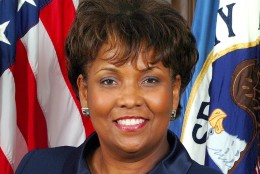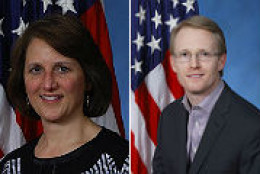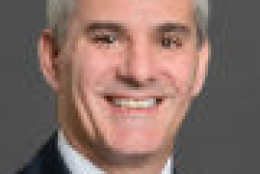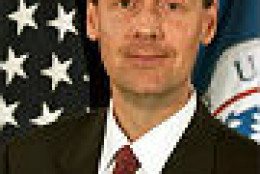National Security Agency
-
National Security Agency Director Michael Rogers told lawmakers that NSA needs to be restructured to deal with an ever-changing threat landscape.
September 25, 2015 -
The federal technology community is seeing a lot of key senior executives switch roles or leave government, including new officials in charge of data analytics at GSA and EPA.
September 08, 2015 Bill Corrington, federal director for the Cloud Security Alliance and Juanita Koilpillai, founder and CEO of Waverly Labs, join host John Gilroy to explain why Software Defined Perimeters is a new paradigm in computer security. September 1, 2015
August 31, 2015-
The National Security Agency's leader -- Adm.l Mike Rogers -- now has a senior adviser for equality. Debora Plunkett holds that position and has been in that role for about almost a year. She tells In Depth with Francis Rose about her office's mission and the responsibilities she was given when the office was created.
August 26, 2015 -
The NSA's adviser on equality says workforce diversity is improving as the agency attempts to balance its mission with the men and women hired to help it succeed.
August 26, 2015 -
The head of U.S. Cyber Command says he wants to create an effective early warning system for cyberspace. But to do it effectively, he says he needs more voluntary sharing of cyber threat information between the federal government and commercial companies.
July 28, 2015 -
A bipartisan group of six senators introduced the Federal Information Security Management Reform Act of 2015 to give DHS the clout it’s been lacking over the last five years and, in some respects, put it on par with the National Security Agency.
July 23, 2015 -
\"A resounding victory for Edward Snowden.\" That\'s how Senate Majority Leader Mitch McConnell described the passage of the USA Freedom Act late yesterday. The legislation, signed by President Barack Obama, will phase out the NSA\'s bulk phone records collection program over the next six months. Instead, phone records will stay at the phone companies and the government will need a warrant to access them. Stewart Baker is a partner at the law firm Steptoe and Johnson. He was the first assistant secretary for policy at Homeland Security and earlier spent two years as the NSA\'s general counsel. He also publishes a podcast on cyber law policy. He joined Tom Temin on the Federal Drive to talk about what\'s next for the NSA.
June 03, 2015 -
The Defense Department is in the final stages of a test to show how derived credentials from the Common Access Card can secure smartphones and tablet computers. Richard Hale, the deputy CIO for cybersecurity, boldly predicts that by the end of the calendar year the military will be issuing derived credentials on mobile devices.
April 03, 2015 -
House intelligence committee leaders unveiled a bipartisan cybersecurity bill Tuesday amid signs of broad agreement on long-sought legislation that would allow private companies to share with the government details of how they are hacked.
March 24, 2015 -
Niagarafiles is a new information sharing program from the National Security Agency. But it's not classified, and it's not even the NSA's anymore. The agency has made it open-source so anyone can use it, or change it. It's part of the NSA's Technology Transfer Program. Linda Burger is director of the Technology Transfer Program at the National Security Agency, and Joseph Witt is development lead at NSA. On In Depth with Francis Rose, Linda said NSA isn't new to the open-source concept.
March 09, 2015 -
Its original intention was ostensibly to help protect the U.S. from terrorist threats. But Edward Snowden's reveal of the extent of the National Security Agency's bulk telephone records program planted seeds of doubt in many minds. Records indicate the NSA was even monitoring domestic calls. Sharon Bradford Franklin is the executive director of the Privacy and Civil Liberties Oversight Board. She joined Tom Temin on the Federal Drive with more on the bulk data collection program, and whether it should even continue.
February 06, 2015 -
It may be unpopular, but bulk data collection by the National Security Agency is effective. Technology can't replicate what bulk data collection can do for intelligence. But more effective methods could be developed so that the collection and use of data is more targeted and controlled. Those are among the findings from a major study of signal intelligence practices. The study was just completed by the National Academies. It was requested by the President and the Office of the Director of National Intelligence a year ago. Michael Leiter is an executive vice president at Leidos and a member of the committee that authored the report. He joined Tom Temin on the Federal Drive to discuss the findings.
January 21, 2015 -
A major cyberattack on the nation's critical infrastructure will happen in the next 10 years, says Adm. Michael Rogers, director of the National Security Agency. He tells the House Permanent Select Committee on Intelligence the only way to handle the threat is to have a true partnership among the public sector, the private sector and academia. Chris Cummiskey is former acting undersecretary for management at the Homeland Security Department. He shared how to do that on In Depth with Francis Rose.
November 25, 2014 -
The National Security Agency closed down an office dedicated to mobility, because devices and apps have become part of the fabric of everything the agency does. But NSA, like all agencies, still must figure out how to secure mobile devices using derived credentials.
August 21, 2014








